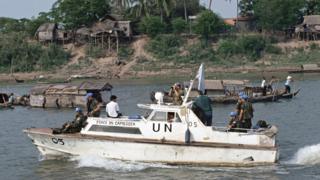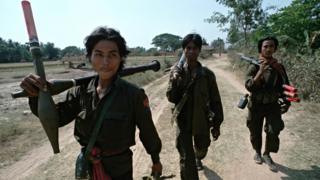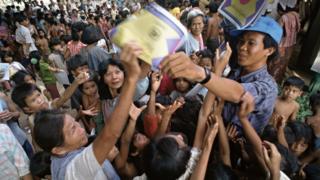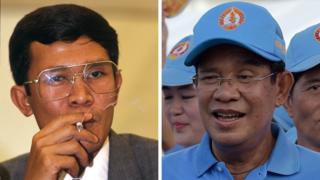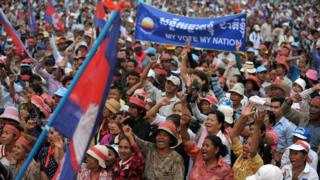When the UN ran a country
In the early 1990s, the international community – through what was then the largest-ever UN peacekeeping operation – made an idealistic attempt to remake broken, war-ravaged Cambodia into a functioning liberal democracy.
Twenty-five years later, Hun Sen, the man who ran the country before the UN arrived, remains in charge and Cambodia is on the eve of a one-sided election widely seen as marking the end of that era.
Sophorn understands the value of a free vote. His early years were spent in a children’s work collective during the brutal Khmer Rouge regime, a four-year reign of terror in which some two million people died, including his own father. He muddled through school after Vietnamese forces toppled the radical Maoists and occupied his country.
Then in 1992, when he was in his last year of high school, the UN’s blue helmets arrived in Cambodia. He stumbled into the international peacekeeping mission after using his rudimentary English to help an Indian officer and his wife buy things at a market in rural Prey Veng province.
“It was the first time that I could talk English with a foreigner in my life,” he said. “He asked me, ‘would you like to work for Untac [the UN Transitional Authority in Cambodia]?'”
More than 20,000 military, police and other personnel of all nationalities had flooded Cambodia, which had been largely cut off from the outside world since 1975. The international contingent was there to do something the UN had never done before: take control of an independent state’s administration and set up and run national elections. It was also meant to help bring about a ceasefire between the various warring factions, disarm their forces and repatriate thousands of refugees languishing in camps on the Thai border.
Tens of millions of dollars poured into one of the world’s poorest countries, sending inflation soaring. Thousands of women entered the sex trade due to the arrival of UN personnel, and HIV/AIDS infections spiked.
But the UN’s arrival also created thousands of jobs and myriad business opportunities for canny Cambodians, and corrupt officials.
Sophorn was soon trained as a voter registration officer. He travelled from village to village spreading news of the upcoming election and signing people up to vote. The mercurial and beloved Prince Norodom Sihanouk – the jazz-loving, French-speaking former king – had returned following years in exile, and after living through a nightmare many Cambodians were optimistic that their country might return to a previous era of peace.
“I think, by Untac, everybody felt happy because the king came back and we were expecting… that the country would be okay, would be as good as the past,” said Sophorn.
Tim Carney, an American who ran Untac’s information and education division, said a priority for his office, which established Cambodia’s first ever independent radio station, had been to convince people that their votes would be kept secret. This was no small matter for a population which had lived under the paranoid Khmer Rouge, which boasted of watching over its populace with “the eyes of a pineapple”.
Mr Carney began the mission with high hopes that the Khmer Rouge – who went on to spend the 1980s waging a guerilla war against the Vietnamese-backed government of Hun Sen – would give up their fight and participate in this UN-organised election.
They had signed the Paris Peace Accords in 1991 that paved the way for Untac. It was a peace deal designed to end a conflict that had been fuelled by bitter Cold War enmities between the major powers, who supplied arms and money to the different Cambodian factions.
With the Cold War ending, it was time to extricate foreign powers, and as Mr Carney puts it, “put politics back into Cambodian hands”.
But ultimately the guerrillas boycotted the polls, choosing instead to ambush peacekeepers and carry out attacks. The run-up to the vote was also marred by a massive campaign of violence and intimidation carried out by Hun Sen’s Cambodian People’s Party (CPP). He had been the presiding force in Cambodia during the latter years of the Vietnamese occupation and this was a taster of the coming decades, said Mr Carney.
“There wasn’t much doubt”, he said, that Hun Sen and the men around him would seek to hold onto power at any cost.
Despite the fragile situation, in late May 1993, more than four million Cambodians turned out to cast their ballots, waiting patiently in the sun in their best clothes.
“It was a festival,” said Mr Carney. In the end, the voter turnout rate was nearly 90%, and the royalist Funcinpec party – fronted by Prince Sihanouk’s son, Norodom Ranariddh, won the vote.
Cambodia – a timeline
Read more
However Hun Sen and the CPP rejected the results and were able to strong-arm their way into a coalition government, using the pretext of a secessionist movement in the east of the country. The UN buckled and Norodom Sihanouk – who by this time had again become king – eventually appointed two prime ministers: First PM Norodom Ranariddh and Second PM Hun Sen.
This rocky power-sharing act lasted until 1997, when factional street-fighting saw Hun Sen finally push Mr Ranariddh aside and take control. The CPP – which by the late 1990s had defeated the Khmer Rouge entirely – has gone on to win elections in 1998, 2003, 2008 and 2013.
The party takes credit for presiding over an era of peace and rapid economic growth, but its critics say that this has come at the cost of a shrinking and increasingly repressive democratic space, where corruption, environmental destruction, and violent land grabs have been allowed to flourish unchecked.
Although the government long heeded some of the democratic norms implanted by Untac – tolerating one of the freest civil society and media environments in the region and allowing competitive polls – the country is going into an election on 29 July that the EU and US are refusing to support.
The government – backed by China – argues this is unfair, pointing to the fact that Cambodians will be able to choose from no fewer than 20 parties. But the result will be certain victory for the CPP, because its main competitor is not allowed to take part.
The Cambodia National Rescue Party (CNRP) was dissolved by the Supreme Court in November based on a government complaint. Its leader sits in a maximum-security prison near the Vietnamese border, accused of conspiring with the United States to overthrow the government.
On Friday, at a final election rally, Hun Sen explained why. “If we didn’t eliminate them with an iron first, maybe by now Cambodia would be in a situation of war,” he told thousands of supporters.
In the run-up to the vote, journalists have been arrested, independent media outlets forced to close, and CNRP supporters calling for a boycott of the polls have been accused of incitement.
Leading opposition politicians – who led a mass protest movement after nearly defeating the CPP in the last national election in 2013 – are now touring international capitals, trying to drum up support for sanctions against the government.
“For 25 years, we kept on sowing the seeds of democracy at all levels…[but] now democracy is dead because of Mr Hun Sen and his total control of the country,” said Mu Sochua, who was the deputy CNRP leader.
The signatories to the Paris Peace Accords have a duty to intervene, she argues, adding: “I think the international community cannot wash its hands [of Cambodia].”
But although the UN’s dream of bringing democracy to Cambodia is “certifiably” dead, this does not mean the effort was pointless, says Sophal Ear, an associate professor of diplomacy at Occidental College in Los Angeles.
“We should be very proud of the 25 years that preceded the death of what Untac achieved… Hun Sen is getting exactly what he wanted in 1993, he just had to wait 25 years for it.”
For Sophorn, who has voted in every election since 1993, there is little point in casting a ballot this time.
The governing CPP, he said, is “like a boxer, boxing alone”.
All pictures subject to copyright
Source: Read Full Article
